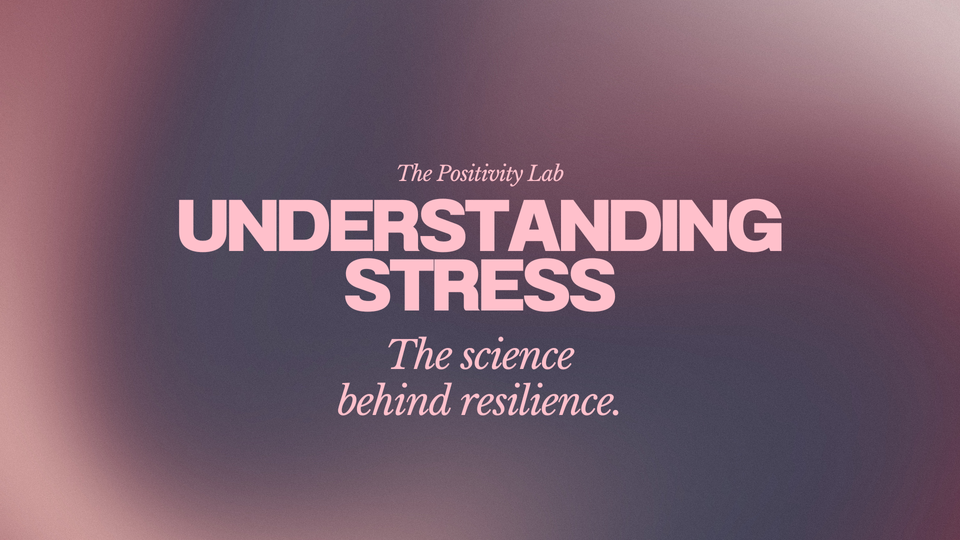The Positivity Lab: Understanding Stress. The Science Behind Resilience

When stress knocks at your door, how you respond can make all the difference. Stress management isn’t about avoiding challenges—it’s about understanding the science behind stress and harnessing strategies that promote resilience. Your brain is capable of remarkable adaptation, and with small, intentional changes, you can transform your stress response for the better.
Here are some innovative yet practical strategies to help you manage stress effectively:
- Dynamic Movement Breaks: Take a few moments throughout your day for quick, simple movements right at your desk or on your way from meeting to meeting. Even small stretches or standing up to change your posture can help alleviate stress and enhance your concentration.
- Cognitive Reappraisal Techniques: Reframe challenges as chances to grow. For example, if you're facing a deadline, instead of viewing it as a threat, consider it an opportunity to showcase your skills. This cognitive shift can lessen the emotional burden.
- Neuroscientific Gratitude Practices: Boost your emotional well-being by thinking about the people you appreciate in your life. For instance, take a moment to visualize a friend who always supports you, and focus on how their presence makes you feel grateful.
Are you ready to take control of your stress levels? Join my 10-day Positivity Challenge and discover how simple daily practices can lead to a calmer, more balanced life.
[Sign up for the 10-day Positivity Challenge]

When we think about stress relief, many people envision soothing baths or wellness retreats. However, effective stress management goes deeper than temporary distractions. It involves understanding the neuroscience of stress and employing strategies grounded in scientific research to cultivate resilience.
What Is Stress, Really?
Stress is our body's natural response to perceived threats or demands. It triggers a cascade of physiological changes, including the release of cortisol and adrenaline, which prepare us to respond to challenges. While this response can be beneficial in short bursts, chronic stress can have detrimental effects on health, leading to conditions such as hypertension, anxiety disorders, and depression.
The Neuroscience of Stress Management
Neuroscience reveals that while stress can alter our brain function, we can also retrain our brains to respond more effectively to stress.
Here are some science-backed insights into how our bodies and minds interact with stress:
- Neuroplasticity: The brain's ability to change and adapt—known as neuroplasticity—allows us to reshape our responses to stress.
- Cortisol Regulation: Chronic stress can lead to increased cortisol levels, negatively affecting physical health. Research by Dr. Janice K. Kiecolt-Glaser and her team found that mindfulness-based stress reduction significantly decreased participants' cortisol levels, emphasizing mindfulness's importance in managing stress.
- Breathing and the Vagus Nerve: Controlled breathing techniques can activate the vagus nerve, which helps manage the body’s stress response. Research by Dr. Richard P. Brown and Dr. Patricia L. Gerbarg, shows that deep, rhythmic breathing can effectively reduce anxiety and stress, helping you feel calmer. You can easily practice this by taking slow, deep breaths for a few minutes whenever you need to unwind.

Innovative Strategies for Stress Relief
Now that we understand the science behind stress, let’s explore some innovative and actionable strategies that go beyond the typical wellness advice:
- Dynamic Movement Breaks: Instead of traditional exercise routines, incorporate dynamic movement breaks throughout your day. Research suggests that even short bursts of movement—like stretching, dancing, or using a standing desk—can significantly lower stress levels and enhance focus.
- Cognitive Reappraisal Techniques: This involves consciously changing how we think about a stressor. A study in Emotion by Dr. James J. Gross found that reframing stressful situations can mitigate the emotional impact of stress. For example, if you're facing a deadline, instead of viewing it as a threat, consider it an opportunity to showcase your skills. This cognitive shift can lessen the emotional burden.
- Neuroscientific Gratitude Practices: Rather than conventional gratitude journaling, try a “neuroscience of gratitude” exercise. Spend 5 minutes visualizing someone who has positively impacted your life. Imagine how your life would be different without their influence. Research by Dr. Robert A. Emmons, a leading researcher on gratitude, indicates that deep reflection on gratitude can lead to significant increases in well-being and lower levels of stress.
- Breath Patterns and Stress Resilience: Instead of just deep breathing, try specific techniques like the 4-7-8 method. This involves inhaling for 4 seconds, holding your breath for 7 seconds, and exhaling for 8 seconds. Research by Dr. Andrew Weil suggests that regularly practicing this pattern can help you better manage emotions and reduce stress. It’s simple to do and can make a real difference in how you feel.
- Nature Immersion: Just 20 minutes outdoors can lower stress and lift your mood, so why not give it a try? Taking time for nature can be easier than you think. Research from the University of Exeter by Dr. Mathew White shows that just 20 minutes in green spaces can significantly reduce stress and improve your mood. Try planning a weekend nature break—whether it’s a local park, a hike, or just sitting in your backyard. It’s a simple way to recharge and disconnect from technology.

Building a Personalized Stress Relief Toolkit
Creating a personalized toolkit for stress relief can be a game-changer.
Here’s how to build yours:
- Experiment with Movement: Choose activities that excite you. Whether it’s a brisk walk, a dance class, or rock climbing, find what engages you and incorporate it into your daily routine.
- Develop Your Cognitive Reappraisal Skills: Regularly practice reframing stressors in your life. Set aside time each week to reflect on recent stressors and brainstorm alternative perspectives that emphasize growth and opportunity.
- Practice Gratitude Differently: Instead of writing down things you’re grateful for, consider visualizing and reflecting deeply on one person or moment each week that has had a lasting positive impact on your life.
- Schedule Nature Breaks: Make a plan to step outside for at least 20 minutes each day. Use this time to engage your senses—notice the sounds, smells, and sights around you.
Build a more resilient mindset
If you’re ready to take control of your stress and cultivate resilience, join my free 10-day Positivity Challenge! Each day, I’ll send you a practical, science-backed strategy that you can easily incorporate into your daily life. These techniques are designed to empower you to face stress with confidence and calm.
[Sign up here for the 10-day Positivity Challenge & build a more resilient mindset]
Remember, stress is a natural part of life, but how we manage it can significantly impact our overall well-being. By understanding the science behind stress and implementing innovative techniques, you can build a more resilient mindset and lead a healthier, more balanced life.

Comments ()